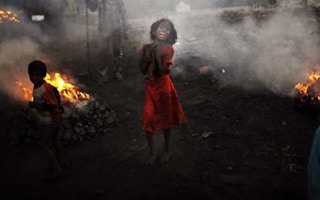Last week, President Barack Obama gave a potentially transformational speech on climate change which is likely to have a major impact on US business and society. This offers a stark contrast to the inaction seen time and again at the UN climate talks, and the downright destructive action taking place in Asia.
To continue reading, subscribe to Eco‑Business.
There's something for everyone. We offer a range of subscription plans.
- Access our stories and receive our Insights Weekly newsletter with the free EB Member plan.
- Unlock unlimited access to our content and archive with EB Circle.
- Publish your content with EB Premium.
At a time when the climate change stakes are reaching alarming heights, the UN talks (their latest round concluded three weeks ago in Bonn) continue to be bedeviled with a lack of momentum and momentous doses of hypocrisy. In an ominous coincidence, the Bonn talks were followed by smoky, hazardous haze engulfing Singapore and parts of Malaysia because of forest fires in Indonesia on concessions operated shamelessly by some of the largest pulp and paper companies in the world.
The Singapore haze is a powerful symbol of what is wrong with the global efforts to fight climate change: Asia is busy toasting and roasting the planet by setting out to build some 1,000 coal-fired power plants (China and India alone account for 76 per cent of the proposed new coal power capacity globally).
The World Bank’s latest climate report predicts what seems like epochal change: unprecedented heat-waves, severe food shortages, intense misery from cyclones, floods and droughts - in a world where temperature increase over pre-industrial level is up to 4 degrees Celsius.
In the meantime, China is decaying with its ecosystem already permanently impaired; India is suffering from sea level rise, coastal erosion, land loss, precipitation decline and droughts; Bangladesh and the Philippines are slowly shrinking; and major cities like Bangkok and Jakarta are at risk of not existing in 30 years. And that’s all before the 1000 proposed coal-fired power plants are built.
Ironically, the World Bank and other international financial institutions such as the Asian Development Bank are key accomplices in Asia’s self-destruction. During the presidency of Robert Zoellick for example (2007 to 2012), the World Bank financed a record amount of fossil fuel infrastructure and its projects committed many countries to coal for 50 years — the life-expectancy of coal-fired power plants.
The path forward to doing the right thing is clear, though strong leadership skills are required.
“
The World Bank must align its rhetoric and its actions and change its entire approach to its lending business, or accept that fighting climate change should rest with a new institution, free of the World Bank’s legacy issues.
First, Asia should decisively tackle fossil fuel subsidies, which according to the IMF equal at least $1.9 trillion a year, or 2.5 per cent of global GDP. A massive $280 billion to $500 billion of these are in China. Asia should gradually replace expensive fossil fuel subsidies with cheaper feed-in tariffs for renewable energy, thus saving money and re-routing cash to the poorest elements of society, to climate change adaptation and to phasing out, over time, fossil fuel infrastructure.
Second, instead of continuing on its current path to self-destruction, Asia – particularly the high population countries of China, India, Indonesia and the Philippines, whose people are likely to suffer more from climate change than anyone else - should change tack and lead the world’s climate change negotiations towards decisive action. This should include taking on binding commitments to cut their emissions and using the carbon markets to mobilise capital on a large scale to finance their low carbon transformation.
Third, the World Bank and all other international financial institutions should stop promoting energy and infrastructure projects which are not climate friendly. This is about much more than not investing in coal-fired power plant: what about roads, ports, airports, buildings? When the World Bank helps finance a road or a port facility, why isn’t it promoting efficient transport infrastructure? What about green buildings? The World Bank must align its rhetoric and its actions and change its entire approach to its lending business, or accept that fighting climate change should rest with a new institution, free of the World Bank’s legacy issues.
Fourth, we need to continue our efforts to ensure we have a proper price for CO2. Today, accountants are signing off on financial statements which don’t make sense: For example, Exxon’s market value takes into account its oil and gas revenues and reserves without any regard for their impact on the planet. A reasonable carbon price would ensure that “true and fair value” accounting leads to a shrinking fossil fuel industry whose access to capital is significantly impaired.
Indeed entire industries such as oil and gas, pulp and paper and others might in fact be loss-making if their destruction of natural capital were taken into account. Instead, without a carbon price, companies are “profitable” even if they are polluting clean air, clean water, destroying eco-systems and forests, and affecting the health and safety of thousands or even millions of people.
President Obama’s speech continues US efforts towards a cleaner economy. Asia - and its financiers - should rise to the challenge and plug the enormous gap there currently is between climate friendly rhetoric and climate destructive actions.
This story first appeared in The Independent.











